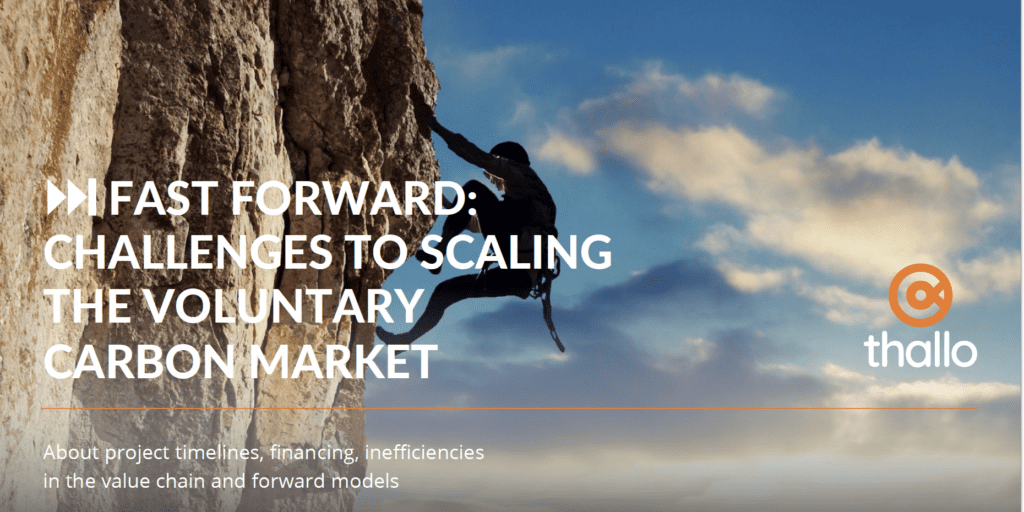Fast Forward: Challenges to Scaling the Voluntary Carbon Market captures insights from 30+ interviews with carbon project developers and experts about the key bottlenecks in the voluntary carbon market.
The report includes:
- An overview of the timeline of a typical carbon project, which can range from 1.5 to 6 years
- An analysis of the impact of verification delays, which could cost project developers up to $2.6 billion and mean 4.8 gigatonnes in undeployed credits by 2030.
- An exploration of the specific challenges related to financing carbon projects, particularly for small and mid-sized developers. 90% of contributors agree that forward products will be key to scaling the VCM.
- Intermediaries capture significant value: investors and brokers made up one-third of the average credit price in 2021. This means $650 million of the value of the carbon markets went to investors and brokers – not project developers – in 2021.

Download Fast Forward: Challenges to Scaling the Voluntary Carbon Market
Thallo’s report suggests a number solutions to the verification bottleneck and highlights there are many opportunities to grasp for registries and VVBs alike: scaling their capacity, working together more closely and integrating feedback, actively working towards a convergence in baseline methodologies across all (including smaller) registries, and adopting new technologies such as dMRV and blockchain. On top of this, the registries have published their intentions to strive towards better training for VVBs, streamlining the work of internal staff and working more closely with accreditation bodies to solve the VVB’s performance issue at the core.
The report also dives into existing carbon credit financing methods. Key insights show that:
- Most often, project developers use some type of forward purchase agreement in combination with their own capital to finance projects.
- Those forward purchase agreements vary greatly: within the interviewed audience, no two forward agreements were the same.
- The experience and size of the project developer are key factors in determining differences in financing needs.
- Financing needs can be traced back to the level of perceived risk of working with a certain type of developer: small and new projects developers encounter significant challenges to secure the capital needed to start their first project, while they are the ones who need it most.
- Depending on which stage projects are in, developers forward sell their credits at a discount. This discount decreases as projects get closer to completion and risk diminishes.
Value-sapping intermediaries are often mentioned as one of the problems in the voluntary carbon market as it exists today. Because buyers and sellers have difficulty finding each other and there is a lack of price transparency, many developers call on brokers and retailers to sell their credits.
In the worst case scenario, expensive investors and high-margin brokers could take as much as 78% of the revenues of the sale of offsets to end-buyers. On average, it is estimated that almost one-third of the revenues generated in 2021 filled the pockets of these intermediaries.
Finally, the report talks about forward models as a way to help scaling the carbon market. These forward models try to standardize and de-risk the forward purchasing of carbon credits as much as possible for both parties, help the seller to secure (early-stage) financing, and help the buyer to hedge their supply of carbon credits for the future. Available and new market solutions are explored in the report, which identifies which products are best suited to scale the market.
The Fast Forward report includes input from the following organizations: Aider, Bio Carbon Partners, Biofix, Blue Carbon Initiative, Carbon Check, Carb0n.fi, Carbon-Plus Capital, Carbon Tanzania, Climate Focus, ClimeTrek, Ecoregistry, Ecosecurities, Fairatmos, Fix6, For Trees Club, Greenoxx, Greentrade, Inherit Carbon Solutions, Inplanet, International Carbon Registry, Ivy Protocol, Kimmeridge, Kita, Respira International, Ripple, Solid World DAO, Space for Giants, Trend CO2, Udaipur Urja Initiatives, Undo and Verra.
Download Fast Forward: Challenges to Scaling the Voluntary Carbon Market





